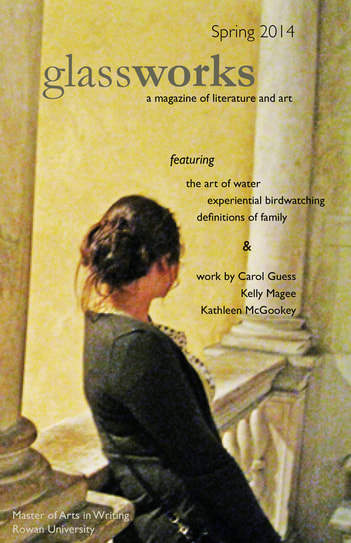|
lookingglass
Through the "Looking Glass," readers are invited to dig deeper into our issues as contributors share reflections on their work. Specifically, "Looking Glass" provides a sort of parlor where authors and artists reveal the genesis of their pieces, as well as provide meta-discursive insight into their textual and visual creative works. Issue 8 Reflections
Read on for reflections by select authors and artists
on the genesis and craft of their pieces in Glassworks and then read the full issue online! |
Brendan Lynaugh
|
Carol Guess & Kelly Magee
|
Kathie Giorgio
"Petit Poissons"

As a part of her entry into middle school, my daughter Olivia had to take what were called “wheel classes:” six-week classes introducing a topic, and then hustling the students onto the next spoke. This barely gave the kids time to do much of anything with the subject, other than memorizing what amounted to a few random facts. Or in the case of her introduction to French class, a song.
Petit Poissons is a monotonous ditty and a standard part of the curriculum taught in many introductory French classes over the years. My older kids, now adults, sang it when they took French in middle school. The song has, conveniently, four verses. In Olivia’s six-week intro class, weeks 2 – 5 were spent learning a verse of the song. By week 6, the students all sang the song lustily together, like the French folk they were trying so hard to be.
On the first day of Week 2, that song came home with my daughter and was sung around the house with gusto. “Petit Poissons, Petit Poissons, nage, nage, nage!” complete with hands pressed together and swimming through the air. Little fish, little fish, swim, swim, swim. And in my case, swim right smack into my ears and stay there for the entirety of the introductory course.
The song would not leave me alone. I sang it in the shower, I sang it in the car. I heard it first thing in the morning and I hummed myself to sleep at night. I even posted the darn thing as a status on Facebook, and my followers and fans immediately lambasted me with YouTube videos of cute children from all over the globe, singing the French little fish song. Multicolored hands swam in the air. No matter what I did, the song would not go away. I was…well, hooked.
Simultaneously as I sang this song for several weeks, and so did my daughter, several domestic crimes happened way too close to our home. In the next town over, an estranged husband walked into a spa/salon and shot his ex-wife point blank in the face as she sat at her work behind the reception desk. A few days later and a few blocks away from my house, a man with a rifle forced his way into his ex-wife’s apartment and held her and another woman hostage after breaking the ex-wife’s arm. A police officer was shot in this incident. And a couple weeks after that, a few blocks in the opposite direction , a man stood on the sidewalk at a very busy intersection and shot his girlfriend, blazed her life out just like that, in front of all the end-of-workday traffic.
Petit Poissons, Petit Poissons, nage, nage, nage!
I sang and I was troubled. Little fish, little fish, swim, swim, swim. Man kills woman, man hurts woman, man kills woman. Neither the song nor the news would leave me alone. The song was an internal constant. The news, an external constant. The headlines and commentary were everywhere.
In all the crimes, the facts came tumbling out like stones tossed in a river. All the men had restraining orders. All of them had orders to not have guns. In one case, the final case, the man had only been out of prison for a month and already had new restraining orders against him by two different women, one of whom he killed.
All three men had priors. Most dating back for years, to when they were youths. So many women were hurt.
As I ruminated over the crimes, I kept singing. In Petit Poissons, each verse leads to a larger fish eating a smaller one. First the little fish swim. Then a barracuda eats them. Then the barracuda swims. He gets eaten by a shark. The shark swims until he gets eaten by a great big whale. And finally, something eats the whale and there are no more fish.
No more fish at all. Non.
As we approached the end of the French class’s six-week cycle, my daughter was singing the entire song, and so was I. The song went in a circle, around and around and around, just like the spoke in Olivia’s wheel classes. It was relentless. In Petit Poissons desperation one day, I sat down at my computer and just wrote out the entire song, hoping that if I typed it, if I physically put the words onto the paper, I could land the horrible little ear worm there and I could hear other music again.
It didn’t work.
“Petit Poissons, Petit Poissons, nage, nage, nage!” I sang, visualizing all the videos of little children singing and swimming their hands in the air. Very little children. Preschoolers, kindergarteners. In my mind, I saw a blonde kindergarten girl, wearing a sweet dress, sitting in a circle in music class, singing the song, swimming her hands, her fingernails pink as oyster shells. As I pictured her, and as she and I sang, she turned in her circle and looked directly at me. Such blue eyes.
And so I wrote a scene where this kindergarten girl sang the song. Behind her, a boy appeared, sitting cross-legged, criss-cross applesauce, as they say in schools now. He wore a red and white striped polo shirt. Jeans. He smiled and sang too. But the whole time he did, he also poked and jabbed her with his pressed fish hands. He poked her to distraction. Then to bruises. And no one could stop it. Not the teacher, not the principal, not the parents.
Swim, swim, swim. Poke, poke, poke.
“Barracuda, Barracuda, nage, nage, nage!” I sang. I thought of my daughter, just entering middle school, her lengthening fingers forming fish fins in the air. Middle school is only three years here in my town, and high school was looming on a not-so-distant horizon. Those long-fingered hands swam in my mind, and then dove, instead of into air, into silk. A young girl, getting ready for a homecoming dance, wearing a dress as blue as the sea, a dress that made her feel beautiful. And then the same boy, the kindergarten jabber, but older now, appeared at her side. He enticed her and brought her to his house. Where the word no had no importance whatsoever.
Non.
Nage, nage, nage.
I wrote it all down, humming.
The shark swam next and I sang next, and on the page, a woman appeared at work, a single mother, bullied into doing unspeakable things for her boss just to keep her job. The boss, the same boy who jabbed in kindergarten, now grown into a shark.
Poke, poke, poke.
The fish grew larger and ate the smaller, ate them all up, until…there were no more fish.
Oh, non! Elle a mangé tous les poissons!
In my mind, with that last ultimate swallow, and with the imagined crack of a gunshot, the song stilled, then swam away. In its place, I had a story. The events in the news still left me troubled, but I was soothed. I saw how these awful events could happen, and now, so could readers. Maybe the circle-round of the song, of the crimes, could be stopped. Once a rhythm is established, once you are aware of it, like the nervous tapping of your foot, you can stop it. I felt the rhythm of the song, then halted it. And I hoped that if I left my readers with an awareness of that rhythm that led to all the fish being eaten, all the women being hurt and killed, my readers would help to stop it too.
Petit Poissons is a monotonous ditty and a standard part of the curriculum taught in many introductory French classes over the years. My older kids, now adults, sang it when they took French in middle school. The song has, conveniently, four verses. In Olivia’s six-week intro class, weeks 2 – 5 were spent learning a verse of the song. By week 6, the students all sang the song lustily together, like the French folk they were trying so hard to be.
On the first day of Week 2, that song came home with my daughter and was sung around the house with gusto. “Petit Poissons, Petit Poissons, nage, nage, nage!” complete with hands pressed together and swimming through the air. Little fish, little fish, swim, swim, swim. And in my case, swim right smack into my ears and stay there for the entirety of the introductory course.
The song would not leave me alone. I sang it in the shower, I sang it in the car. I heard it first thing in the morning and I hummed myself to sleep at night. I even posted the darn thing as a status on Facebook, and my followers and fans immediately lambasted me with YouTube videos of cute children from all over the globe, singing the French little fish song. Multicolored hands swam in the air. No matter what I did, the song would not go away. I was…well, hooked.
Simultaneously as I sang this song for several weeks, and so did my daughter, several domestic crimes happened way too close to our home. In the next town over, an estranged husband walked into a spa/salon and shot his ex-wife point blank in the face as she sat at her work behind the reception desk. A few days later and a few blocks away from my house, a man with a rifle forced his way into his ex-wife’s apartment and held her and another woman hostage after breaking the ex-wife’s arm. A police officer was shot in this incident. And a couple weeks after that, a few blocks in the opposite direction , a man stood on the sidewalk at a very busy intersection and shot his girlfriend, blazed her life out just like that, in front of all the end-of-workday traffic.
Petit Poissons, Petit Poissons, nage, nage, nage!
I sang and I was troubled. Little fish, little fish, swim, swim, swim. Man kills woman, man hurts woman, man kills woman. Neither the song nor the news would leave me alone. The song was an internal constant. The news, an external constant. The headlines and commentary were everywhere.
In all the crimes, the facts came tumbling out like stones tossed in a river. All the men had restraining orders. All of them had orders to not have guns. In one case, the final case, the man had only been out of prison for a month and already had new restraining orders against him by two different women, one of whom he killed.
All three men had priors. Most dating back for years, to when they were youths. So many women were hurt.
As I ruminated over the crimes, I kept singing. In Petit Poissons, each verse leads to a larger fish eating a smaller one. First the little fish swim. Then a barracuda eats them. Then the barracuda swims. He gets eaten by a shark. The shark swims until he gets eaten by a great big whale. And finally, something eats the whale and there are no more fish.
No more fish at all. Non.
As we approached the end of the French class’s six-week cycle, my daughter was singing the entire song, and so was I. The song went in a circle, around and around and around, just like the spoke in Olivia’s wheel classes. It was relentless. In Petit Poissons desperation one day, I sat down at my computer and just wrote out the entire song, hoping that if I typed it, if I physically put the words onto the paper, I could land the horrible little ear worm there and I could hear other music again.
It didn’t work.
“Petit Poissons, Petit Poissons, nage, nage, nage!” I sang, visualizing all the videos of little children singing and swimming their hands in the air. Very little children. Preschoolers, kindergarteners. In my mind, I saw a blonde kindergarten girl, wearing a sweet dress, sitting in a circle in music class, singing the song, swimming her hands, her fingernails pink as oyster shells. As I pictured her, and as she and I sang, she turned in her circle and looked directly at me. Such blue eyes.
And so I wrote a scene where this kindergarten girl sang the song. Behind her, a boy appeared, sitting cross-legged, criss-cross applesauce, as they say in schools now. He wore a red and white striped polo shirt. Jeans. He smiled and sang too. But the whole time he did, he also poked and jabbed her with his pressed fish hands. He poked her to distraction. Then to bruises. And no one could stop it. Not the teacher, not the principal, not the parents.
Swim, swim, swim. Poke, poke, poke.
“Barracuda, Barracuda, nage, nage, nage!” I sang. I thought of my daughter, just entering middle school, her lengthening fingers forming fish fins in the air. Middle school is only three years here in my town, and high school was looming on a not-so-distant horizon. Those long-fingered hands swam in my mind, and then dove, instead of into air, into silk. A young girl, getting ready for a homecoming dance, wearing a dress as blue as the sea, a dress that made her feel beautiful. And then the same boy, the kindergarten jabber, but older now, appeared at her side. He enticed her and brought her to his house. Where the word no had no importance whatsoever.
Non.
Nage, nage, nage.
I wrote it all down, humming.
The shark swam next and I sang next, and on the page, a woman appeared at work, a single mother, bullied into doing unspeakable things for her boss just to keep her job. The boss, the same boy who jabbed in kindergarten, now grown into a shark.
Poke, poke, poke.
The fish grew larger and ate the smaller, ate them all up, until…there were no more fish.
Oh, non! Elle a mangé tous les poissons!
In my mind, with that last ultimate swallow, and with the imagined crack of a gunshot, the song stilled, then swam away. In its place, I had a story. The events in the news still left me troubled, but I was soothed. I saw how these awful events could happen, and now, so could readers. Maybe the circle-round of the song, of the crimes, could be stopped. Once a rhythm is established, once you are aware of it, like the nervous tapping of your foot, you can stop it. I felt the rhythm of the song, then halted it. And I hoped that if I left my readers with an awareness of that rhythm that led to all the fish being eaten, all the women being hurt and killed, my readers would help to stop it too.





